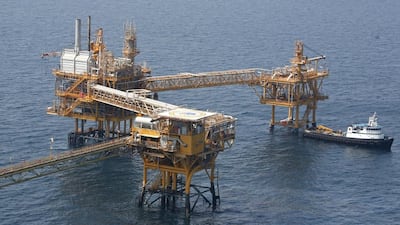Falling oil prices will not threaten the UAE’s fiscal or current account surpluses, economists said, as a global recovery and prospects of increasing inflation stoke the country’s boom.
Confirmation of the resilient economy came late on Friday when Standard & Poor’s maintained its ratings on Abu Dhabi’s debt.
S&P kept its ratings on the emirate’s long-term debt at AA and on short-term debt at A-1+. The agency also said Abu Dhabi’s ratings outlook is stable.
The ratings agency explained: "The exceptional strength of Abu Dhabi's net asset positions also provides a buffer to counter the negative impact of oil price volatility on economic growth and government revenues, as well as on the external account."
On Friday, the US benchmark futures contract, West Texas Intermediate for November delivery, closed at $89.74 a barrel, down $1.27 from Thursday. It was the first time WTI had closed below $90 since April 2013.
Brent North Sea crude for November, the main European contract, slumped $1.11 to $92.31 a barrel, its lowest close since June 2012.
Despite the drop in oil prices, the country as a whole can rely on steady, albeit decreasing current account and fiscal surpluses for the next few years, analysts said.
The global oil price is headed lower as demand from China weakens while US exports grow, said Paul Gamble, the head of sovereign ratings at Fitch, the ratings agency.
“That’s [an oil price] Abu Dhabi would be comfortable with,” Mr Gamble said. “Abu Dhabi will still run a budget surplus at that price. That’s not a kind of level that will have an impact on government spending.
“For now, the outlook for the real estate, construction, finance and manufacturing sectors seems fairly rosy, with a plethora of projects under way,” wrote the EIU in a recent report on Abu Dhabi’s economy.
Growth in Abu Dhabi’s non-oil sectors grew at 10 per cent last year, significantly outstripping oil sector growth. Continued state investment in non-oil sectors will be supported by an oil price above the UAE’s break-even point.
The UAE Government aims to diversify Abu Dhabi’s economy away from dependence on oil, which accounted for 51.4 per cent of the emirate’s economy in 2013.
The EIU wrote that, despite decreasing oil prices, Abu Dhabi will still be able to create business opportunities in important non-oil sectors, while continuing to provide generous social support schemes and well-remunerated public sector jobs for Emiratis.
Inflationary pressures also look set to increase, despite a strengthening dirham and a cooling of Dubai’s real estate market.
Mr Gamble expects that inflation will peak at 5 per cent within the next year or so.
“It’s mainly domestic demand pressures that are pushing up inflation,” he said.
“But you’re not going to see the inflation problems you saw in 2007 and 2008, when the dollar was weakening and commodity prices were surging.”
The real estate market is starting to slow – but a lag between house price changes and official statistics means it may be some time before the inflation rate falls.
“There has definitely been a slowdown in the rate of increase in house prices in Dubai. Some of that has been driven by government action: mortgages [caps] and the land transaction tax have had an impact,” Mr Gamble said.
Countrywide inflation stood at 2.4 per cent in August, driven by rising housing costs.
Rent prices in Dubai increased by 2 per cent in the third quarter of the year, slower than the 3 per cent increase in the second quarter, according to the real estate research firm JLL.
Sale prices in Dubai rose 1 per cent over the same period – down from 6 per cent the previous quarter.
“Early signs suggest that rental prices are due to decrease – so that would lower inflation, which had been driven by price increases in Dubai’s housing market,” Dima Jardaneh, senior economist at EFG Hermes in Dubai, said last week.
A strong dirham could also slow rises in the price level.
The dollar, to which the dirham is pegged, is trading at a four-year high against a basket of international currencies, including the UAE’s major trading partners, according to data from Bloomberg.
This makes imports into the UAE cheaper, and could lower prices for consumers over the next few quarters.
The high dirham will have “a softening effect on inflation”, Mr Gamble said. “But it depends on how long the exchange rate remains high, and whether firms pass the savings on to consumers.
abouyamourn@thenational.ae
* with additional reporting by Agence France-Presse
Follow The National's Business section on Twitter

